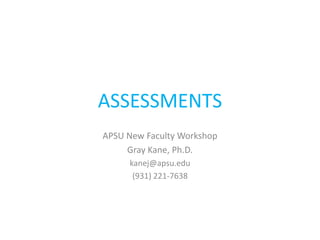
Developing Course Assessment Strategies
- 1. ASSESSMENTS APSU New Faculty Workshop Gray Kane, Ph.D. kanej@apsu.edu (931) 221-7638
- 2. Introduce yourselves to your neighbors.
- 3. Which of the following do you most agree with? A. Assessment strategies can reduce the likelihood of academic dishonesty. B. Assessment strategies can improve student learning. C. Assessment strategies can improve the sense of classroom community. D. Assessments measure not only student performance but also the effectiveness of course delivery.
- 4. Assessments and Academic Dishonesty
- 5. Which of the following do you most agree with? A. Early assessments can reduce the likelihood of academic dishonesty by encouraging students to plan study time for your course right from the start. B. Early assessments can reduce the likelihood of academic dishonesty by enabling both you and your students to identify and remediate weaknesses before they prohibit student success. C. Diverse assessment methods (tests, projects, papers, participation points …) can reduce the likelihood of academic dishonesty by enabling those with anxieties or deficiencies in one assessment method (e.g., test anxiety or writing deficiencies) to demonstrate proficiency in other ways. D. Avoiding high-stakes assessments (for example, an exam worth 40% of the final grade) can reduce the likelihood of academic dishonesty by providing students with room to fail.
- 6. Which of the following do you most agree with? A. Frequent assessments can reduce the likelihood of academic dishonesty by structurally encouraging students to study regularly. B. Process-based assessments can reduce the likelihood of academic dishonesty by granting the instructor greater oversight over students’ creative process. C. Frequent comprehensive assessments can reduce the likelihood of academic dishonesty by decreasing the perception of “disposable knowledge.”
- 7. Assessments as Learning Opportunities
- 8. Which of the following do you most agree with? A. Students can learn effectively through high frequency, repeatable quizzes that draw random conceptual questions from online test banks. B. Auto-graded online quizzes or clicker activities can improve student learning by providing instant feedback. C. Assessments that require multiple senses (visual, auditory, and kinesthetic) can improve student learning by stimulating different parts of the brain. D. Peer grading can provide enough emotional distance between students and the assessment to enable them to evaluate questions and answers more clearly. E. Self-grading can improve metacognitive thinking (reflecting on one’s own thinking process).
- 9. Assessments and Classroom Community
- 10. Which of the following do you most agree with? A. Group assessments like team projects not only provide social learners with an opportunity to acquire and demonstrate knowledge, but also enhance students’ relationships with each other. B. After an assessment, acknowledging and discussing common errors not only provides students with feedback, but also can decrease students’ sense of isolation by showing students they are not alone in their mistakes. C. Peer grading provides students with evaluation opportunities, but it also enhances the sense of classroom community by helping students think of their own performance in relation to their peers.
- 11. Assessing to Improve Course Delivery
- 12. Which of the following do you most agree with? A. You can use assessments to identify and overcome common student misunderstandings. B. You can use assessments to determine the effectiveness of specific learning opportunities. C. You do not have to assign points to every assessment. D. Assessments measure not only student performance but also the effectiveness of course delivery.
- 13. Which of the following do you most agree with? Assessments can … A. reduce the likelihood academic dishonesty B. serve as an additional learning opportunity C. improve the sense of classroom community D. help you improve course delivery E. ALL OF THE ABOVE
- 14. Selected Bibliography Angelo, Thomas A. and K. Patricia Cross. Classroom Assessment Techniques: A Handbook for College Teachers; Second Ed. San Francisco, CA: Jossey-Bass, 1993. Freeman, Scott and John W. Parks. “How Accurate Is Peer Grading?” CBE Life Sciences Education; 9 (4): 482-488. American Society for Cell Biology, 2010. Nilson, Linda B. “The Truth about Learning Styles.” Keynote at the International Lilly Conference on College Teaching. Oxford, OH. November 18-21, 2010. Sadler, Philip M. and Eddie Good. “The Impact of Self- and Peer-Grading on Student Learning.” Educational Assessment; 11 (1): 1-31. Mahwah, NJ: Lawrence Erlbaum Associates, Inc., 2006. Wehlburg, Catherine M. Meaningful Course Revision. Boston, MA: Anker Publishing Company, Inc., 2006.
